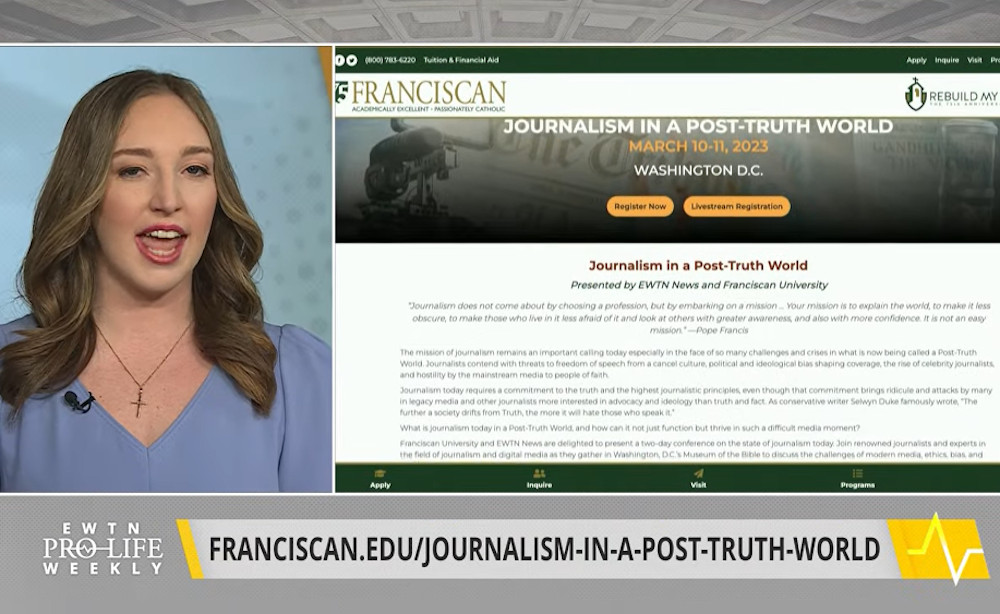
Prudence Robertson with EWTN Pro-Life Weekly announces the "Journalism in a Post-Truth World" conference, hosted by EWTN and Franciscan University of Steubenville. (EWTN/YouTube screenshot)
The headline at the National Catholic Register was funny, in a sad kind of way. "EWTN CEO Michael Warsaw: Catholic Journalists Are Called to Be 'Truth Tellers,' " it read. Funny because Warsaw is CEO of the Register, and their understanding of "truth" is far more relativistic than most Catholic journalistic enterprises.
As my colleague Brian Fraga reported on the two-day conference about journalism in a "post-truth" cultural landscape, jointly sponsored by EWTN and Franciscan University of Steubenville, Warsaw, in his keynote address, observed, "When it comes to news related to the church, and even religion in general, as we all know the issue of fake news is compounded by the fact that many in the secular media simply have little knowledge on religious subjects, and especially of the Catholic Church."
Warsaw added, "Catholics only need to look around us to see the effects of the post-truth era in the discussions about abortion, gender, healthcare and religious liberty."
Now, to be sure, I have observed many times, as recently as my newsletter on Tuesday (If you haven't signed up to get the newsletter, you can do so by clicking here), and my column on Monday, our culturally conditioned understanding of what counts as "true" is always a bit in flux. People ignore the best scientific evidence we have about climate change if they are invested in fossil fuels, but they certainly want the scientific advances made in treating heart disease if they fall ill.
Ours is an ideological age, so you would think more time would be spent on attaining ideological consistency. Nope. It was always remarkable to me that during the debate on the Affordable Care Act and its implementation, you could watch Fox News insist that government needed to stay out of the examining room, and if you were watching MSNBC during discussions of the Dobbs' Supreme Court decision on abortion you heard the exact same thing. Libertarianism for me but not for thee.
Advertisement
Warsaw, and the network he leads, however, suffer from a particular blind spot, and that is their inability to transcend the myopia of a variety of conservative American Catholicism. They repeatedly and continually forget, to borrow an insight from the late Fr. Andrew Greeley, that the opposite of Catholicism is not Protestantism; the opposite of Catholicism is sectarianism. And EWTN epitomizes a sectarian Catholicism that equates their own understanding of the demands of faith with the totality of the demands of faith. This violates common sense, of course, but also violates the first commandment. It makes an idol out of one's own opinions.
In this case, to associate "fake news" with only one side in the culture wars is itself a kind of fake news. Yes, those on the left talk about the unborn child as if it is not a child. But former President Donald Trump raised fake news to an art form. Who can forget poor White House press secretary Sean Spicer being made to defend the insane proposition that Trump's inauguration was the largest ever.
There is a deeper problem than EWTN's political hackdom. It is the way the network and its various outlets misunderstand both the Christian and the journalistic vocation. Montse Alvarado, the president and chief operating officer of EWTN News, gave the game away when she said, "The journalists for EWTN, they're not searching for the truth. They've found the truth, and they want to communicate it."
Both journalists and Christians must always be searching for the truth. Thinking "we've found it" turns the faith into a possession. True faith possesses us, we do not possess it.
When then-Cardinal Joseph Ratzinger warned about the "dictatorship of relativism" in his 2005 sermon Pro Eligendo Romano Pontifice, his warning was not the bumper sticker it has since become among conservative U.S. Catholics. He said:
Today, having a clear faith based on the Creed of the Church is often labeled as fundamentalism. Whereas relativism, that is, letting oneself be "tossed here and there, carried about by every wind of doctrine", seems the only attitude that can cope with modern times. We are building a dictatorship of relativism that does not recognize anything as definitive and whose ultimate goal consists solely of one's own ego and desires. We, however, have a different goal: the Son of God, the true man. He is the measure of true humanism.
The problem is that the culture warriors at EWTN fail to grasp the relationship of their faith to the culture, conflating God's horizon with their politics.
Ratzinger was calling us to an adult faith. It is true that some theologians in the post-conciliar era drank too deeply at the wells of various ideological persuasions, but most did so out of a sincere effort to better understand the faith and the questions our times pose to that faith. The "definitive" and "ultimate" goal Ratzinger described cannot be identified simply with the nostalgic faith on display day in and day out at EWTN.
The problem here is not that the Lord Jesus cannot find a place in a conservative heart just as he cannot find a place in a liberal heart. The problem is that the culture warriors at EWTN fail to grasp the relationship of their faith to the culture, conflating God's horizon with their politics.
"If we have no faith in the absolute faithfulness of God-in-Christ, it will doubtless be difficult for us to discern the relativity of our faith," wrote H. Richard Niebuhr in his classic book Christ and Culture. "Because that faith is weak, therefore we shall always endeavor to make our personal or social faith into an absolute."
This is the insight to which Ratzinger pointed but which is missed by almost all actors in the religious culture wars. EWTN's journalism conference was simply one more example of American Catholic myopia.








